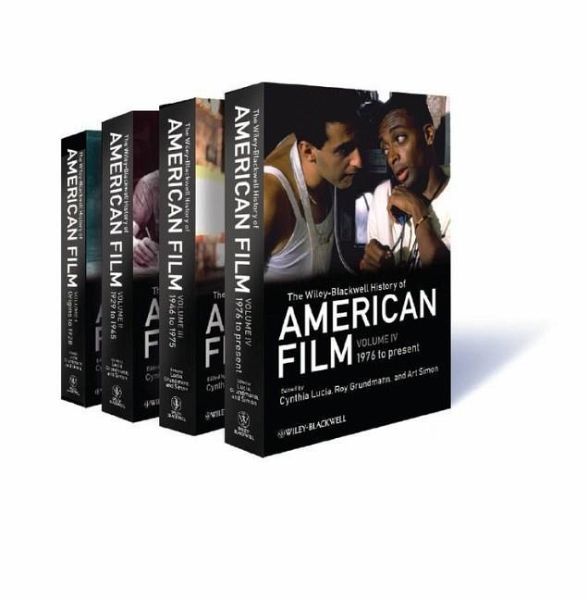
The Wiley-Blackwell History of American Film, 4 Volume Set
Versandkostenfrei!
Versandfertig in über 4 Wochen
941,99 €
inkl. MwSt.

PAYBACK Punkte
471 °P sammeln!
Comprising over 90 essays and richly illustrated with over 200 images, the Wiley-Blackwell History of American Film provides a chronological portrait of American film history from its origins to the present day.Taken as a whole, the essays in this collection represent a comprehensive and nuanced overview of American film history from the intersecting perspectives of industry, audiences, aesthetics, culture, politics, issues, and ideology.Unabashedly ambitious, deeply historical, and unprecedented in its multi-faceted examination of film history, this collection offers you:Over 90 original essa...
Comprising over 90 essays and richly illustrated with over 200 images, the Wiley-Blackwell History of American Film provides a chronological portrait of American film history from its origins to the present day.
Taken as a whole, the essays in this collection represent a comprehensive and nuanced overview of American film history from the intersecting perspectives of industry, audiences, aesthetics, culture, politics, issues, and ideology.
Unabashedly ambitious, deeply historical, and unprecedented in its multi-faceted examination of film history, this collection offers you:
Over 90 original essays written by an international cast of film scholars
Discussions of the industrial and institutional components of film history, including multiple modes of production, distribution, and marketing
Investigations into the political, social, and economic factors that informed industry change and framed the reception of films
Engaging close readings and in-depth analysis of canonical and non-canonical films
Profiles of essential industry figures - major directors, stars, and producers - along with important figures outside the industrial mainstream
An exploration of the history of film criticism and culture, and central issues in American film historiography
The most authoritative collection of fresh investigations available in one state-of-the-art resource
Selected by Choice as a 2013 Outstanding Academic Title
Taken as a whole, the essays in this collection represent a comprehensive and nuanced overview of American film history from the intersecting perspectives of industry, audiences, aesthetics, culture, politics, issues, and ideology.
Unabashedly ambitious, deeply historical, and unprecedented in its multi-faceted examination of film history, this collection offers you:
Over 90 original essays written by an international cast of film scholars
Discussions of the industrial and institutional components of film history, including multiple modes of production, distribution, and marketing
Investigations into the political, social, and economic factors that informed industry change and framed the reception of films
Engaging close readings and in-depth analysis of canonical and non-canonical films
Profiles of essential industry figures - major directors, stars, and producers - along with important figures outside the industrial mainstream
An exploration of the history of film criticism and culture, and central issues in American film historiography
The most authoritative collection of fresh investigations available in one state-of-the-art resource
Selected by Choice as a 2013 Outstanding Academic Title












